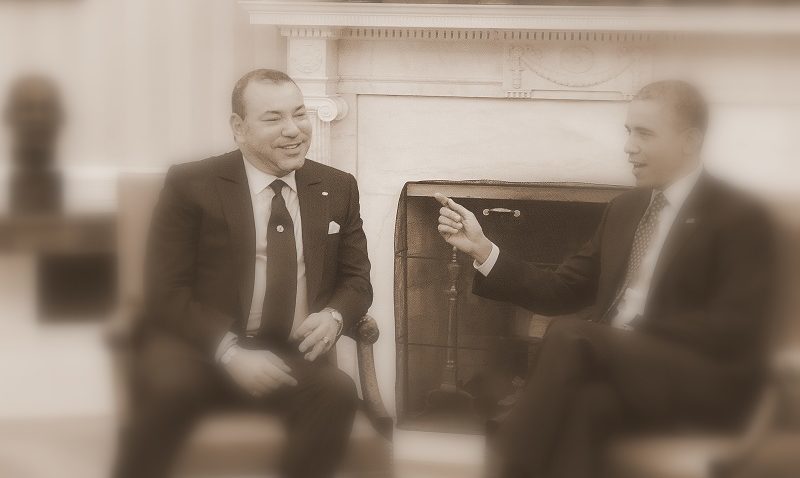Alifpost- Omo Aiman Boudchar
he end of the American dream for Morocco is not in reference to immigration, as hardly any Moroccans immigrate to this country, preferring to immigrate to Europe, refers to another subject: The Western Sahara. This is due to the prevailing disappointment within the political and media classes in Morocco after America’s stance on the Sahara conflict.
In recent years, Washington has been putting pressure on Morocco over the Sahara issue. The UN Security Council’s draft of the final resolution, passed on April 29 2016, was written by the US Ambassador, Samantha Power. In the draft, Morocco is required to lead the return of the civilian members who were part of the MINURSO mission, respect human rights principles in the Sahara, and it dismisses Morocco’s solution proposing autonomy for the region.
Historically, Morocco always felt that Washington was a support of theirs regarding the Sahara conflict, and deemed that Americans preferred autonomy and not a referendum on self-determination as a solution to the conflict.
However, the political reality has been quite a shock for Moroccans, who are discovering that the US is becoming the country causing Morocco the most problems in the Sahara conflict.
King Mohamed VI himself did not hesitate to insinuate, on the 20th April 2016, that Washington’s stance, hostile in regard to the interests of Morocco in the Sahara, was part of an international conspiracy. It is hard to believe that a conservative King of a pro-Western ancient dynasty maintains a discourse similar to that of the former Venezuelan President Hugo Chavez, but so it is. Overall, these days the US has become, both in the Moroccan press and in official statements, synonymous with being the political enemy that wants to take away the Sahara from Morocco.
Morocco criticizes Washington for not taking into account that Morocco was the first country in the world to recognize the independence of the US, which occurred on February 20, 1778. And Morocco is also finding it strange that, after having stood with Washington during the cold war, the Americans are now adopting a hostile stance on the Moroccan territorial unit.
However, over recent decades, Washington, regardless of whether a Republican or Democrat was presiding, has never ruled in favor of the Moroccan Western Sahara.
The US administrations, during the terms of Carter, Reagan, Clinton and George H. W. Bush, defended the self-determination referendum, because at the time Morocco was in acceptance of employing this policy instrument as a solution. In 2001, Morocco rejected the referendum and began to back autonomy, and it was from this date on that the problems over the Sahara between Morocco and Washington began.
In 2003, George W. Bush’s administration was about to impose the Baker Plan II as a solution to the Sahara issue. The plan consisted of a period of autonomy for five years, followed by the subsequent holding of the referendum.
With the Obama administration, the situation has become quite difficult for Morocco. On the one hand, those in positions of power, like John Kerry and Susan Rice, Foreign Minister and Minister of National Security Advisor respectively, defend the referendum on self-determination. And on the other hand, the US ambassador to the Security Council, Samantha Power, brings the issue of human rights in the conflict to the forefront. In 2013, Washington wanted to assign the monitoring of human rights in the Sahara to MINURSO.
There is also concern that the relationship between Morocco and Washington deteriorated further with regard to the Sahara issue when the post of the Personal Envoy of the Secretary–General for Western Sahara was given to an American. This was also the case of the former envoy James Baker, former foreign minister, and of the current envoy, Christopher Ross.
It turns out that while Washington never recognized the Sahara as a Moroccan territory, they never wanted to exert pressure on Morocco, occasionally even praising the proposal for autonomy. The US knew that the loss of the Sahara could mean the end of the monarchy in Morocco, as the former US ambassador to the UN, John Bolton, revealed in his book Surrender is not an option.
The Moroccan government had always interpreted this as indirect support of its position from the US. This has been an error of assumption. Today, Moroccans have awakened from the American dream, only to realize that the reality is different and it is this: the US does not support Morocco in this conflict.
In summary, the US has become an enemy in the eyes of the Moroccans, and the government of Morocco is seeking new allies, namely Russia and China. The King himself announced this in his speech on April 20, 2016.
Therefore, what we are facing is the end of the American political dream in Morocco, and the culprit: Western Sahara.

